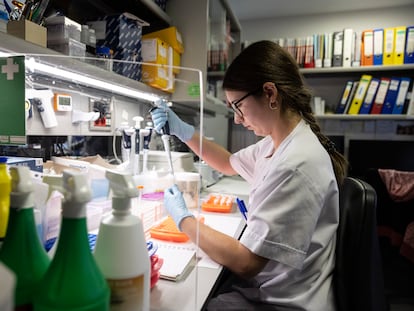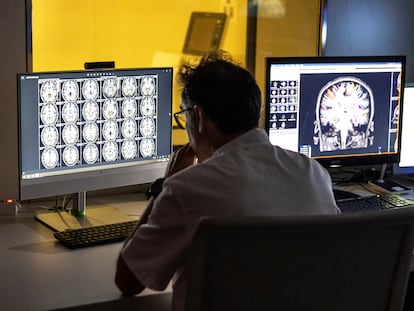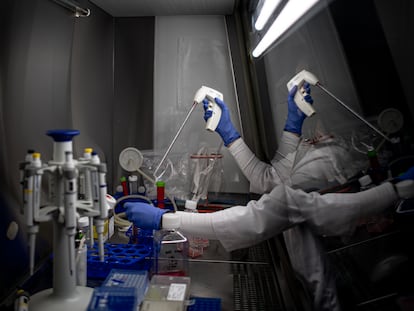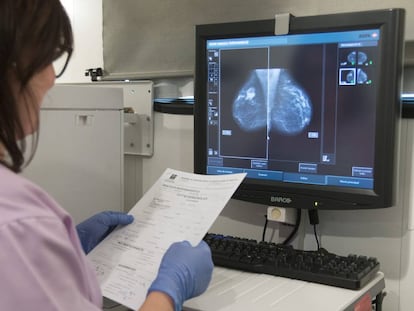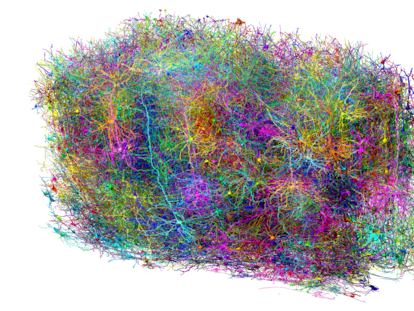A study identifies four key turning points in the development of neural connections throughout life, a finding that may help in understanding alterations in cognition and behavior
US plastic surgeons support the operation, but the Spanish Society of Neurology warns that its therapeutic role is not sufficiently supported
A major European clinical research event in oncology gives a boost to antibody–drug conjugates, treatments that work like a Trojan horse, delivering chemotherapy to the interior of malignant cells
The Venezuelan opposition leader, recently awarded the Nobel Peace Prize, asserts that the Maduro regime ‘is weaker than ever’
The first snapshot of the state of health in the post-pandemic world reveals high levels of deaths among young people in the United States, Canada, and Mexico ‘driven by economic, social, and psychological factors’
Researchers say the catalog has already led to the identification of genetic mechanisms involved in kidney cancer and will help develop personalized treatments in oncology
A scientific review examines advances in the field and addresses the controversy surrounding new drugs, questioned due to their price and modest efficacy
A team of scientists identifies a molecular mechanism that helps explain how airborne toxins influences Lewy body dementia
The science suggests that undergoing a detox is a ‘simplistic’ strategy to combat society’s hyperstimulation
The melanoma expert and new director of research center IDIBAPS reflects on the impact of Trump’s cuts and warns of the slowing of scientific advancement
‘The Lancet’ warns that the risks of more than two-thirds of known substances are being ignored. The scientific publication has launched a Countdown to monitor the situation ahead of a global meeting in Geneva
An analysis debunks long-held misconceptions about the best way to perform resuscitation and emphasizes the importance of immediate chest compressions in the event of cardiac arrest
Toxic behaviors, such as ghosting or intermittent flirting to maintain the other person’s interest, damage self-esteem, increase feelings of loneliness, and fuel dating app fatigue
As anti-obesity drugs gain traction and thinness is increasingly equated with health, the movement to accept diverse body types is being sidelined
The British scientist examines the techniques that companies use to influence public opinion and how these tactics impact our health
The science historian speaks openly about the effects of Trump’s research cuts, the rise of pseudoscience, and how the global web of disinformation is spun
Novo Nordisk’s campaign, which aims to speak ‘without filters’ by declaring obesity a disease, has been strongly criticized on social media: ‘It’s indecent’
The Montreal-based researcher, a pioneer in the neuroscience of music, claims the role of this discipline as a tool with therapeutic potential for communication and expression of emotions
Scientists have observed these tiny particles in the intestine, in the liver… and even in the brain. Experts have evidence that microplastics can cause DNA damage
The meeting of the American Society of Oncology focused on optimizing immunotherapy and other advanced treatments for improving survival
About half of male adults between the ages of 40 and 70 suffer from erection trouble, but there are effective treatments, such as Viagra or penile prostheses
Dense breast tissue can mask cancer in conventional tests. A study shows the most effective complementary imaging techniques for detecting malignant lesions in screening programs
A trial shows that semaglutide stops fat accumulation and liver fibrosis in a disease associated with metabolic dysfunction
Problematic substance use leads to relational difficulties, mental health issues, and addiction, which, in the worst cases, can result in overdose deaths or suicide
A study describes the psychological disorder that lies behind the uncontrollable impulse to steal: it is very little studied and surrounded by a layer of stigma that complicates diagnosis
Information gathered in just one cubic millimeter of a rodent’s cerebral cortex will help unravel the complex neural networks behind cognition



